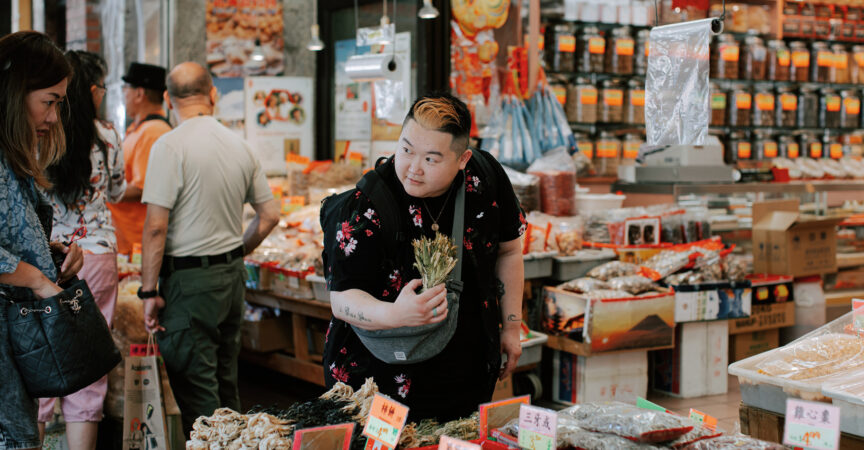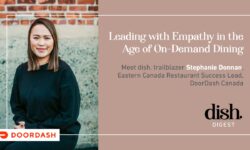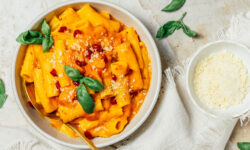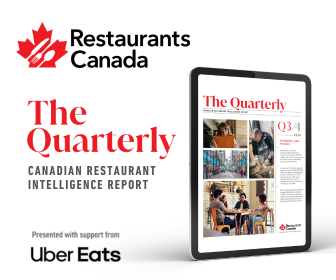CHEF EVA CHIN SERVES IT RAW
American ex-pat Chef Eva Chin is a rising star in the Canadian culinary scene. Her culinary style has been crafted in some of the finest kitchens around the world. She draws her inspiration from herself and a deep desire to radically improve the industry for generations that follow.
The Canadian leg of her journey began in Vancouver’s Royal Dinette and Boulevard restaurants. Now she’s part of the Toronto scene as executive chef at Avling Kitchen and chef, host and founder of the Soy Luck Club dinner series.
Our candid, introspective conversation was a great joy and even greater privilege.
Read on. It’s well worth it.
MM: You’re American, raised in Hawaii on your grandparents’ farm. That sounds idyllic.
I was born and raised on a farm. My dad is a diplomat—he works for foreign services—so my parents constantly had to move to different countries. My grandparents have a traditional Hawaiian mentality; they really wanted the kids to stay on the island, so we were raised by our grandparents who were fishermen and farmers. That had a big impact on me because everything we wanted to eat, my grandparents made us do it ourselves. We were told to go out and harvest our own vegetables, fish our own seafood… they taught us how to cook it from raw.
My maternal grandmother was one of the rare female, non-Japanese sushi chefs that made it in Hawaii. She instilled a lot of Japanese cooking philosophy in me and my Asian roots were established by being surrounded by such a wide, diverse Asian population in Hawaii. I wasn’t closely raised by my parents—I didn’t have that traditional maternal-paternal relationship. My grandparents were “everyone” and it was more of a nurturing style of growing up. That really made me realize, even as a young kid, that even though I may not know someone, food is a common language between strangers. It set the path for me to become a chef because I have the need to feed and nurture people because of the way I was raised. Food can nourish and save someone. Having no food can destroy someone. So, growing up, food really stood out to me as more than just a commodity and more than just a necessity. It was a means of storytelling. It was a means of identity. It was a means of weaving community and culture together.
MM: How did your parents feel about your career choice? Were they supportive?
A career as a chef wasn’t really an optimal option. My dad really wanted me to follow him in politics. The formula, after high school, was to follow in his footsteps, go to Harvard, study law and get a lot of degree and so forth, whatever he had had to do for his career, but that did not interest me. I wasn’t sure I wanted to cook, but I was sure I did not want to be a politician.
I ended up getting into Boston University. I didn’t get into Columbia, which was my first choice, I ended up going to Boston. It was really important to my family that I attend an Ivy League school. I really like psychology, so I majored in behavioral science.
There really was—and there still is—a part of me that really saw a future of doing research and writing papers. I thought I had a future in fieldwork and research. After I graduated, I was lucky enough to have numerous job offers. One of them was to join the police force in the criminology department. But, young Eva did not want to give up partying and did not want to work at a place that did substance testing.
MM: Uh oh… So how and why did you reconnect with food?
I’m a Millennial kid, and at that time, backpacking was a huge thing, right? So I thought, “Oh, you know what? I can always come back to America and do that nine-to-five job, so I’m just going to go backpack for a bit. I’m just going to go see what’s out there.” With my parents, having spent most of their career traveling and living abroad, I’d visit them in the summer. I’ve always had that travel bug in me. As an American, I wasn’t really welcome. In Europe, in terms of visas, the maximum stay for Americans is very short in numerous countries. I knew I needed money to travel, so I thought cooking, or construction or teaching English would be the best way to make money under the table.
My first journey was to Japan because I wanted to trace my grandmother’s culinary footsteps. It blew my mind. It was everything my grandmother taught me amplified by a hundred. It was less about instilling the culinary aspect, it was learning the philosophy of culinary, the discipline behind it. The thoughtfulness, the mindfulness was the theory of culinary that Japan instilled in me. I still didn’t know yet if I want to be a chef, but I wanted all the qualities a good chef had. I wanted to discipline, I wanted the patience, I wanted the skill sets. I wanted that tenacity.
While I was in Japan, my chef told me I needed to go to Paris, because that’s where all the chefs go. So, after my visa ended in Japan, I took my backpack and went to Europe, to Paris. I’ll never forget my first meal. I walked in… I can’t remember the name of the restaurant; I’m really terrible at French. The chef was Iñaki Aizpitarte, he was a very, very talented chef at that time. He’s a bit older now, but at that time, he was in his prime. He was like a rock and roll, 20-something chef with tattoos. He was calling the pass with a cigarette in his mouth. I was like, “What is happening…?” The food was phenomenal and it was next-level plating. I thought, “This is the height of that movement of haute cuisine.” But this guy was so rude to his cooks. He was barking orders…he was an incredible jerk with this cigarette hanging out of his mouth.
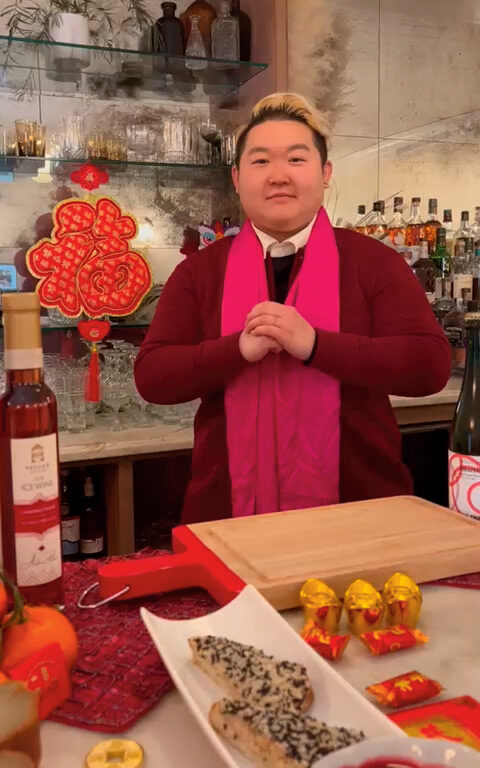
MM: Was this a moment of arrival or a kind of rude awakening for you?
I wasn’t okay with this. This was not what I wanted. I had just come from a pristine Japanese kitchen into this crazy world and I felt the same trend as I continued to eat out in places that were considered top dining, “rock-and-roll chef” kinds of restaurants. I felt a chaotic type of stress from the French kitchens while I was in Paris, and I thought to myself, “I don’t think I can survive this.” I was terrified. I was intimidated. It was incredibly sexist. I didn’t want to put myself in such an uncomfortable position. I didn’t know how to speak the language. So I took the train and I went to London. And I’m so grateful I did that.
London changed me. London, was where I told myself, “This is what I’m gonna do. I’m not gonna go back to do research; that’s done. This is what I want.”
I immediately felt a sense of comfort, because I spent some years growing up in Hong Kong—and this is pre-1997—so, there’s a deep, colonialized British culture, that is in my blood. So when I stepped on to London, I was like, “Wow, this is comforting. It’s like I’m in Hong Kong, right.” And, at that time, the food was amazing. All of these British chefs in London were rising from working under, you know, the top great chefs, like Pierre Koffmann, Marco Pierre White, Raymond Blanc at that time. It was their proteges’ era.
I was very lucky. I staged, I worked three or four jobs sometimes in order to pay rent. I was living by Brick Lane and the rent was cheap there because at night, there was all these ethnic food stalls open, so a lot of people found it undesirable to live above it. It was perfect for a broke cook and it expanded my palate. Even though I was living in London, I did not eat fish and chips—I was eating curry every night. I loved my time in London. It opened my mind to a lot of cultures.
MM: How was the kitchen culture different in London?
One thing I really noticed, up to this point in my career, was that London was the least sexist of any culture of kitchen I worked in. It was actually very matriarchal and very common to see females in the kitchen. They were very tough. I remember talking to my colleagues at that that time and it never occurred to them that woman couldn’t be leaders. I mean, for God’s sake, they had the Queen and Margaret Thatcher.
That doesn’t exist in America. There’s no strong woman leader in America we really look up to. I was so inspired -by that environment, you know, the disciplinary, slightly micromanaging, but truly equal opportunity environment in London. It made me fall in love with cooking as a true professional chef. It pushed me to every limit—past every limit. I owe my mentor, Shane Osborn, everything. Forever.
One thing I really noticed, up to this point in my career, was that London was the least sexist of any culture of kitchen I worked in.
MM: It sounds like a wonderful, intense time in your early career. Why did you leave?
I was super burnt out by London. I still wanted to see Europe, so I saved my money and did a backpacking trip. I didn’t want to do more full-time jobs at that point. I wanted to live my life and just see what was out there. Shane, during our personal time, had said, “I’m not attached to my Michelin stars, Eva. I’m just gonna return them one day and travel the world with my family.” I laughed at the time, but he did it. He really did. That really changed me. It made me realize that you can be the chef who cooks for accolades, cooks for the Michelin stars, cooks to be on the magazines, but what are you doing it for? Is that really why you are a chef? So, I had this amazing, world-class chef telling me that, “At the end of the day, it’s just food. I don’t care about the stars, I care about my family.”
That inspired me to go back out and see more of the world. That educates and shapes a cook far more than just slaving away in a kitchen. I spent the next six months just backpacking around Europe, doing some unpaid stages here and there.
After that, I travelled throughout Australia, southeast Asia. I didn’t stop traveling for a long time. Eventually, I ended up in Vancouver for a friend’s wedding in Whistler. I partied so hard at the wedding, I missed my flight. I really liked BC and thought it was beautiful, so I decided to stay and check out Canada. It’s been my neighbour in America for so long.
MM: So, you ended up in Canada because you missed a flight…?
Totally, and I settled in Vancouver at first. It was very beautiful, but very boring. I kept getting this itch, so I actually left twice in the five years I was there.
I left to go to Hong Kong again to work with my mentor Shane. He had opened two new restaurants there. After awhile, I came back to Vancouver. I got dissatisfied again, left again and came back. Again, I felt it couldn’t give me enough. It was too “chillax,” it wasn’t my “hustle city.” I had been interviewing extensively in San Francisco and I had a job with Dominque Crenn at Atelier Crenn. That year she had been voted Best Female Chef in the World. That was my goal. I always had to work for the best and learn from the best. But at the very moment I was about to leave for San Fran, I met my wife.
MM: The universe had other plans for you…
Right?
So, we got married and, for some reason, my career has been rising since. I’m very lucky. When I came back from our honeymoon, I was the executive sous chef at Royal Dinette, a new restaurant a friend of mine opened in Vancouver. It was farm-to-table and very daring. I was just married and in love, so I thought I’d relax and help my friend out as his sous chef. But when I came back from our honeymoon, he told me he was opening a new restaurant and wanted me to be the head chef. I was like, “Cool, cool.” That gave me a platform in Vancouver. That’s when people noticed my name.
MM: So, you finally found purpose in Vancouver, and a star was born.
That was the wildest time of my career. It was my real first executive chef job. Before then I was only head chef of my own pop-ups or a residency. But now I had a business card! My friend transitioned me in for a month, but then he peaced out to open a new restaurant. I had to figure a lot of it out on my own.
I came up with the wildest creations in my career at Royal Dinette. The Globe and Mail gave me a four-star review. It was incredible for my career, but it was not good for my mentality. I became so full of myself to the point where, when I was creating dishes, there was no voice in my head to say, “Stop. Think.” I was just so confident. I was riding a high and I was so young and untamed. So, as it was a creative high-point, I almost feel like it was very unfinished or rough. It was the first time I put my name out in Vancouver, and the reviews were good. Thankfully, I wasn’t
traumatized by that.
MM: You got away with it.
I did. When I think back, I can’t believe I didn’t flame out. I was constantly angry because I was overworking myself. I felt like I had so much to prove. And, I was a very, very tough boss to myself and my colleagues.
After two years of that, my wife sat me down and said, “This needs to change. Something’s going bad in your life right now, and you’re gonna crash and burn.” She laid down the law, and she was right. I was so tired mentally; I almost hated myself. So, in 2018, I quit.
MM: That’s a huge intervention and a huge point of introspection. What was it like to just walk away at such a high point?
I needed to snap out of it. And you know what? I sat in my apartment for one whole month. I needed to rest my body and my mind. It was during this time a friend of mine who was also my seafood supplier asked if I had heard of Alex Chen.
At that time Alex Chen was a rising name in Canada, not just in Vancouver. His restaurant. Boulevard Kitchen & Oyster Bar, continually won awards for best fine dining. I was looking at his food, and this beautiful plating. It was French, traditional plating that reminded me of my days in London, and I really missed it. And that’s when I realized my problem. Royal Dinette was very Nordic farm-to-table, following the Noma trend. Our plates were very experimental. I thought, “Oh my god. I got sucked into that.” I had forgotten all of the discipline, the finesse, that really drove me as a chef. I needed that back in my life.
I reached out to Alex Chen and he immediately hired me as sous chef. He had four sous chefs at that time. I came in knowing I had to prove that I had what it takes to be his chef de cuisine. I was wounded from my experience at Royal Dinette and my ego was super hurt, so I was ready to go to work and pick myself back up.
Boulevard was a monster of a kitchen. We had 45 cooks on staff and we did 200 covers—it was easily a $10 million-dollar restaurant. It was a pivotal decision for me. Roger Ma was my direct boss; my executive chef. There was no chef de cuisine at that time—Roger and Alex had never successfully hired a chef to cuisine other than themselves. No one had been able to handle that kitchen, and other than one female sous chef that they’ve had from the beginning, there hadn’t been a female in management. I didn’t recognize all those red flags. I was there to fix my problems.
I was there for six months before I was promoted to chef de cuisine. That was a big piece of humble pie for me. Alex and Roger were very good to me and I’m forever grateful for Boulevard slapping me awake. I was dealing with my own struggles. It made me chef and a business person. It made me realize that running a restaurant wasn’t just an outlet for a chef, It was the f****** business. You need to make money.
Boulevard was all about making money, but also producing the finest dining and food. That’s incredibly hard and but that is the sustainable way to actually make this industry work. Alex is smart. He doesn’t run by ego. He genuinely listens to customers, and he genuinely cooks food that sells. That’s what really woke me up as a chef. And when I got promoted to chef to cuisine, I felt like I’ve truly healed the trauma that I put on myself at Royal Dinette.
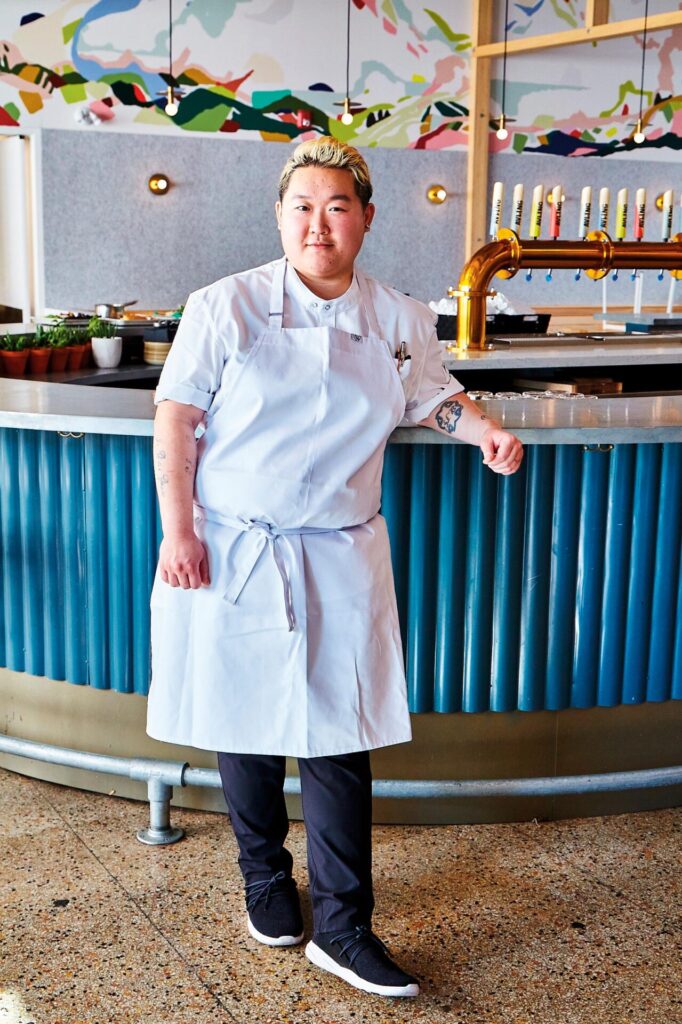
MM: So, this is where you really start to shine, and start becoming your true self as a chef?
Yes. I finally started really moving forward at Boulevard. I started working with local farmers. I put farm-to-table in, when before they were just ordering from distributors. I started teaching my cooks about agriculture. I began to prioritize inclusion and diversity in the team. I started being the head chef I really should have been from the beginning—not just creating amazing dishes, but actually being a leader.
That’s when I realized I was ready to tackle the next level of my career, tackling the problems of the inner industry. I realized all the red flags were unsustainable parts of our industry, underpinned by classic fine dining traits like overworking cooks, not offering any kind of benefits, food waste. When I fixed my own problems, I started to really see all the others and wanted to change them for the next generation.
Before then, cooking was 95 per cent of my life as a chef. It’s only 20 per cent right now, which leaves a lot more room for creating a safe environment for the well-being of my cooks—mentoring and training them to be a chef one day, not just another cook.
MM: How did you end up in Toronto? Was it Momofuku?
When Momofuku poached me and brought me to Toronto, it opened a portal of cooking Asian ingredients. Having an everyday Asian pantry in my kitchen was something very unfamiliar for me. All of a sudden I was that kid who went to Japan for the first time again. And I walked into my third set of problems to solve and face: the identity, heritage and authenticity of my cuisine.
Throughout my career, there have been three groups of challenges—internal, external and culinary—that I’ve faced and am battling still. I’m trying to figure out how to be authentically myself, learning how to trade my tweezers for chopsticks. And, after Momofuku or at Avling, where I really took the leap of introducing Asian progressive cuisine in Leslieville to granola moms. But now I can proudly say there are people traveling from Markham and west end to Leslieville just to eat my food. I want to bring diversity to Leslieville, you know, and I’m doing it.
MM: You don’t do things in small measure, huh?
No! I guess I think that if you have the power to work toward a greater cause, just do it. It’s just so funny that most chefs don’t realize, the impact they have. That’s why, as the years go by I realize that my role as a chef has so much less to do with cooking than people think and so much more to do with things people don’t even think about.
MM: This is a fantastic conversation, and it’s a little emotionally uncomfortable. It’s quite remarkable really—a little like a TED Talk.
I’m really into personal development and I listen to Brené Brown on a daily basis— uncomfortable conversations as part of my everyday. It still is uncomfortable but you know like there’s not a lot of us in the industry. I don’t know where or when walk into another gay, minority female in the industry who will be given a platform like I was given in the past two years. But that’s not right. And there’s so much pressure. A friend of mine in the film and television industry once said to me, “Sometimes I’m burnt out from just representing. Do you ever feel that way?” And I said, “No, because you have millions of followers and I don’t even know what that feels like.” But, I do feel that sometimes, I do feel tired sometimes being the one people go to for Lunar New Year or the only female Asian chef to talk to. I get it, and you know, like 10 years ago, that was Anita Lo.
Throughout my career, there have been three groups of challenges – internal, external and culinary – that I’ve faced and am battling still.
MM: What are your greatest hopes and fears for the hospitality industry?
My biggest fear is that we fail to set our next generation up for success—that this keeps happening to us. We need to provide the right tools to our cooks to succeed, and that’s not just a knife.
We need to develop the person, not just the cook. I don’t remember every service, they’re all a blur. But, I do remember entire conversations from my career. I remember the sous chefs who didn’t stand up for me. I remember the leaders who weren’t the people I needed them to be. These are the things that stick with you as a cook. One of the most common things cooks share when we meet are trauma stories. We’re like, “Your chef threw something hot in your face?!? Oh, that’s so funny.” But it’s not funny, and it’s often the most common thing we share. It’s like our past trauma a form of currency. We tell the story and say we’re over it, but the fact we’re telling it means we’re not over it, right? If you take something out on a cook, know that you’re going to be the story this cook is going to tell for the next 20 years of their career.
We need to be mindful of how we speak to and treat one another. Anyone who has an opportunity to lead and mentor has to think about the impact we have on our staff, and the trauma we leave behind. We need to be as mindful about our mentorship, as parents need to be mindful about parenting. It’s not just teaching you how to cut an apple anymore. The golden quote of our industry has always been, “This is how it’s always been done.” This is the most toxic sentence ever.
The art of leadership is the art of hospitality. Here’s an example: At one of the restaurants I worked, someone ordered one of our tomahawks, and they wanted it well done. I watched my chef just lose it, berating the customer and throwing a hissy fit—behind closed doors, obviously. But then, he disappeared for about 10 minutes, and he came back and personally cooked the tomahawk, well done, to perfection. He turned around to the cooks and then says to us, “I’m so sorry guys. I just lost it for a second because I felt like I was cooking this tomahawk for myself. But I’m not. We’re cooking for the customer, and we’re going to make sure this is the best well-done tomahawk this customer ever has. Because that’s what hospitality is about.”
That’s always stuck with me.
MM: You’re judging the Garland Culinary Competition at RC Show this year. What drew you to the opportunity?
I think I am ready to step out and go beyond just influencing my own team and my own cooks, and I really support competition. But once again, we’re back to the same topic. Let’s say a cook creates this plate for this competition. Why did they create this plate, this way? Are you creating this plate to tell Chef Eva and Chef Tre how talented you are? Is it, “Look! I have 12 different components with 12 different methods of preparation.” Or, are you making it this way because it’s just so damned tasty. Or it’s something your grandmother made for you and you’re trying to show me that this is why you’re a chef. Did you make this plate because you had to make it 4,000 times at your last restaurant and you feel it’s the best representation of your skill? There are many reasons that compel a chef to make that plate, but at the end of the day, there are four things I ask: Are you proud of it? Are you actually going to make this one day for your mom and dad? Is it tasty? And, number four, if you could do it again, what would you do differently?
As a young cook, if you still haven’t figured out what you’re trying to prove, then you need to reconsider this industry because you have a long road ahead of you and you’re going to tire yourself out from just proving yourself. Being a young cook and joining a competition like Garland is one of the best ways of figuring that out.



